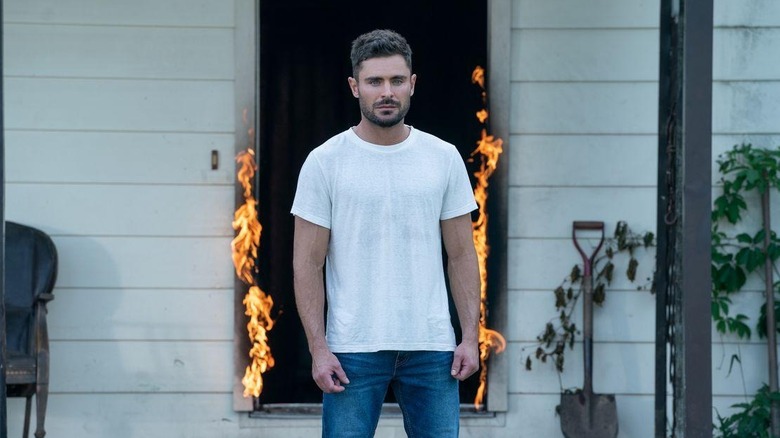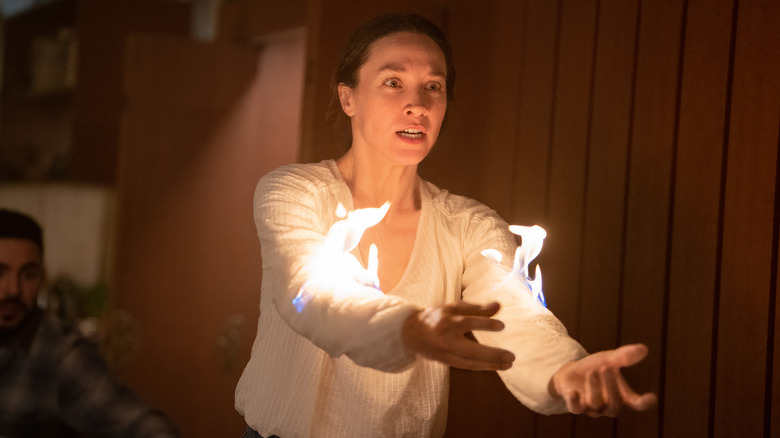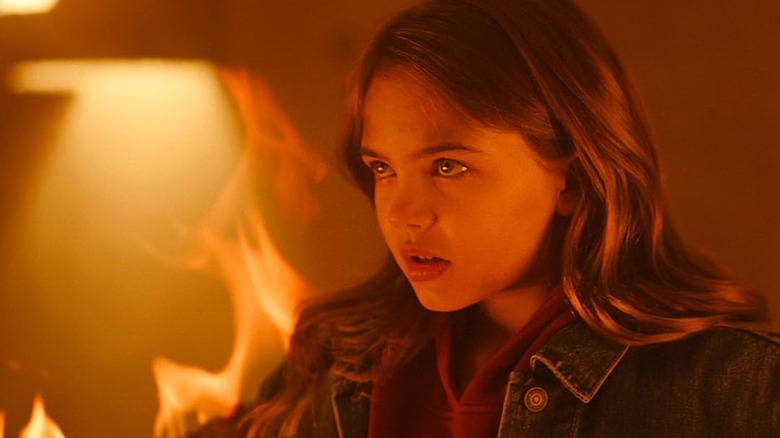5 Reasons Why Stephen King's Firestarter Remake Flopped At The Box Office
We may receive a commission on purchases made from links.
Stephen King's many, many novels and short stories have long been fuel for Hollywood storytellers to make use of. King has been such a deep well worth tapping so repeatedly that many of his works have been adapted multiple times. Such is the case with "Firestarter," which was first turned into a movie in 1984 with a young Drew Barrymore as the central star. In 2022, Universal Pictures and Blumhouse Productions attempted to update the tale for modern audiences. It didn't go well.
Directed by Keith Thomas ("The Vigil"), the "Firestarter" remake hit theaters in summer 2022 and, if you'll pardon the pun, flamed out at the box office with a not-so-great $3.8 million opening. It never recovered and finished its run with just $9.7 million domestically to go with $5.3 million internationally for a grand total of $15 million worldwide against a reported $12 million budget, which doesn't account for marketing.
The remake went down as a bomb despite having a promising cast led by up-and-comer Ryan Kiera Armstrong ("Black Widow") as the flame-throwing Charlie and Zac Efron ("The Greatest Showman") as her protective father, Andrew. It even had horror legend John Carpenter providing the score.
As of this writing, the remake is trending in Netflix's top ten most-watched movie charts. So despite being a flop at the time of its release, it's finding an audience in the here and now. But what went wrong at the time of its release? How did promising source material and lots of great pieces on the board amount to something so disappointing? Now seems like a good time to examine the biggest reasons why "Firestarter" flopped at the box office. Let's get into it.
The Firestarter remake was met with terrible reviews
Critical opinion doesn't always kill a movie, but when reviews are lousy, it certainly never helps. In the case of "Firestarter," it was met with a downright terrible response. Even worse, that extended to audiences as well, which might have killed it before it even really had a chance. Especially given that in 2022, theaters were still far more in the midst of recovery mode from the pandemic than they are now.
The movie centers on Charlie, who has lived her childhood on the run and has kept her pyrokinetic powers in check. But as she turns 11, it gets harder to control, and mysterious forces want to capture her. In his 5 out of 10 review of "Firestarter" for /Film, Chris Evangelista called it "lukewarm at best."
The remake currently holds a terrible 10% approval rating from critics on Rotten Tomatoes to go with a better-but-still-bad 47% audience score. It also earned a pretty terrible C- CinemaScore, which means actual moviegoers were pretty dissatisfied with it. That's one of the best indicators we have when it comes to how a movie will perform beyond opening weekend. In this case, it fell off a cliff.
A wave of strong summertime competition got in the way
Releasing any non-blockbuster in the summer movie season can be a gamble, as it tends to be pretty crowded. In 2022, as the box office was still in recovery mode, there wasn't as much room as there had been in the pre-2020 days. Reviews aside, "Firestarter" was fighting a steep uphill battle in light of the stiff competition that particular summer.
It opened as Marvel's "Doctor Strange in the Multiverse of Madness" topped the charts on its second weekend with $61.7 million. "Multiverse of Madness" eventually made a massive $955 million worldwide. That's just the start, though, as "The Bad Guys" and "Sonic the Hedgehog 2" were also still raking in the dough, ensuring this King adaptation had to settle for fourth place, scarcely above eventual Best Picture winner "Everything Everywhere All at Once" ($3.3 million) on its eighth weekend.
It got harder as heavy-hitters like "Top Gun: Maverick" and, to a lesser degree, "Downton Abbey: A New Era" arrived in the weeks that followed. "Jurassic World Dominion" was sort of the final nail in the coffin when it debuted in June. However, Universal attached "Firestarter" as a double feature with "Dominion" in select theaters, which helped add nearly $1 million to its total. Clever though that may have been, it only helped so much.
Development hell didn't do the Firestarter remake any favors
It's not always a death sentence, but any time a movie gets trapped in development hell for years on end, it can be a bad omen. Such was the case with "Firestarter," with Universal first planning a remake in late 2010.
Updates were few and far between for a while until Blumhouse got involved in 2017. At that time, Akiva Goldsman ("Winter's Tale") was set to direct the new take on King's novel, with Scott Teems penning the screenplay. Teems, who also co-wrote "Halloween Kills," went the distance with the project, undoubtedly producing quite a few drafts along the way.
A remake always felt like a good idea. King was by no means a fan of the '84 movie and, while it has some fans, it's not as though it's an untouchable classic like "The Shining." Syfy also produced the "Firestarter: Rekindled" miniseries in 2002, which wasn't exactly a critical darling and has largely been forgotten. There was reason to believe someone with the right take on the material could make something more cinematic and impressive. It just didn't pan out that way. Who knows? Maybe in a few years, someone else will emerge with a take on the material. It remains a nut that hasn't been fully cracked.
Blumhouse has struggled in the pandemic era
It wasn't nearly as evident three and a half years ago when this movie first hit theaters, but Blumhouse, one of the biggest names in modern horror, has struggled mightily in recent years. Before the Covid-19 pandemic upended the industry in 2020, it felt like the house that Jason Blum built could do no wrong. Often working with budgets of just $5 million or less, most of the studio's movies at least made a little money on occasion; something like Jordan Peele's "Get Out" or Scott Derrickson's "Sinister" would pop off and become a big hit.
"Firestarter" was one of the first of a newer batch of pandemic-era Blumhouse titles that were more expensive, relatively speaking, at $12 million. Granted, at that price point, it still eventually made money, but it was still a huge disappointment against expectations. Meanwhile, in the years since, it's become increasingly clear that this movie was more of a predictor of things to come for the studio.
2023 produced huge hits like "M3GAN" and "Five Nights at Freddy's," but it also resulted in costly disappointments such as "The Exorcist: Believer." Blumhouse's entire 2024 slate, save for "Speak No Evil," was at best disappointing and at worst disastrous, with "Night Swim," "Imaginary," and "Afraid" all falling short. 2025 has been similarly tough, which is why the success of "Black Phone 2" came as such a relief. "Wolf Man," "The Woman in the Yard," "Drop," and worst of all, "M3GAN 2.0" all failed theatrically.
Unfortunately, "Firestarter" wasn't a one-off. It was some of the first evidence we had that Blumhouse was struggling to adapt to the rapidly changing, streaming-first Hollywood landscape we now live in, where audiences increasingly favor staying home unless properly motivated to leave the couch.
Firestarter fell victim to Universal prioritizing streaming
Not to intentionally bury the lede or anything, but nothing was a bigger factor in killing any chance "Firestarter" had at the box office than the decision to release it on Peacock on the same day it hit theaters in the U.S. This sort of simultaneous release strategy was, in 2021 and 2022, rather popular in Hollywood as studios like Universal were increasingly being used to prop up streaming services. In this case, the Comcast-owned Peacock.
As a result, "Firestarter" was dangled to help entice people to subscribe to Peacock so that they could see a brand new Stephen King movie that was in theaters from the comfort of home. It didn't hurt "Five Nights at Freddy's" in 2023 as the movie made nearly $300 million globally. But that was closer to the exception that proves the rule. "Halloween Ends" also went to Peacock and theaters, and it made a respectable $105 million. However, that's compared to the $130 million made by "Halloween Kills" in a pandemic-hampered 2021 and the massive $255 million made by "Halloween" in 2018.
It speaks volumes that Universal isn't doing this with "Five Nights at Freddy's 2." It is also worth pointing out that Peacock has lost billions of dollars since launch, meaning these hybrid releases didn't ultimately do a lot to help the company's bottom line. Not that I'm advocating people should spend hard-earned money to see a bad movie in theaters, but from Universal's POV, this was a poor, shortsighted financial decision.
You can also grab "Firestarter" on Blu-ray or DVD from Amazon.





